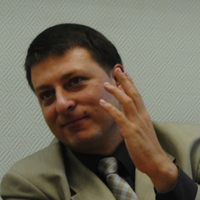
Alex Semyonov
Alexander M. Semyonov, Ph.D.,
Semyonov is a co-founder and co-editor of the international scholarly journal: Ab Imperio: Studies of New Imperial History and Nationalism in the Post Soviet Space. Semyonov was a Visiting Scholar at the W. Averell Harriman Institute, Columbia University (USA), Research Fellow at the Center for European Studies, Rutgers University (USA), Research Fellow at Johannes Gutenberg University (Mainz, Germany) and a Visiting Research Fellow at the Graduate School for East and Southeast European Studies, the University of Regensburg (Germany) where he is also appointed Honorary Research Fellow. He taught Russian imperial history as associate visiting professor at the University of Michigan (Ann Arbor, USA) and University of Chicago (USA), at the University of Chicago he was also appointed a Mellon Foundation European Scholar Fellow. He co-edits with Ronald Suny of a book series “Imperial Transformations” (published by Routledge).
Semyonov is a co-founder and co-editor of the international scholarly journal: Ab Imperio: Studies of New Imperial History and Nationalism in the Post Soviet Space. Semyonov was a Visiting Scholar at the W. Averell Harriman Institute, Columbia University (USA), Research Fellow at the Center for European Studies, Rutgers University (USA), Research Fellow at Johannes Gutenberg University (Mainz, Germany) and a Visiting Research Fellow at the Graduate School for East and Southeast European Studies, the University of Regensburg (Germany) where he is also appointed Honorary Research Fellow. He taught Russian imperial history as associate visiting professor at the University of Michigan (Ann Arbor, USA) and University of Chicago (USA), at the University of Chicago he was also appointed a Mellon Foundation European Scholar Fellow. He co-edits with Ronald Suny of a book series “Imperial Transformations” (published by Routledge).
less
InterestsView All (8)
Uploads
Papers by Alex Semyonov
and Institutes (CHCI), in collaboration with the International Council for Philosophy
and Human Sciences (CIPSH). The views expressed in the contributions to the World
Humanities Report are those of the authors and are not necessarily those of the editors,
scientific committee, or staff of CHCI.
Keywords
Russian liberalism, Russian Parliament, Constitutional Democratic Party, Russian Revolution 1905-1907 and 1917
and Institutes (CHCI), in collaboration with the International Council for Philosophy
and Human Sciences (CIPSH). The views expressed in the contributions to the World
Humanities Report are those of the authors and are not necessarily those of the editors,
scientific committee, or staff of CHCI.
Keywords
Russian liberalism, Russian Parliament, Constitutional Democratic Party, Russian Revolution 1905-1907 and 1917
This third volume of the Reset DOC “Russia Workshop” collects a selection of the Dimensions and Challenges of Russian Liberalism conference proceedings, providing a broad set of insights into the Russian liberal experience through a dialogue between past and present, and intellectual and empirical contextualization, involving historians, jurists, political scientists and theorists.
The first part focuses on the Imperial period, analyzing the political philosophy and peculiarities of pre-revolutionary Russian liberalism, its relations with the rule of law (Pravovoe Gosudarstvo), and its institutionalization within the Constitutional Democratic Party (Kadets). The second part focuses on Soviet times, when liberal undercurrents emerged under the surface of the official Marxist-Leninist ideology. After Stalin’s death, the “thaw intelligentsia” of Soviet dissidents and human rights defenders represented a new liberal dimension in late Soviet history, while the reforms of Gorbachev’s “New Thinking” became a substitute for liberalism in the final decade of the USSR.
The third part focuses on the “time of troubles” under the Yeltsin presidency, and assesses the impact of liberal values and ethics, the bureaucratic difficulties in adapting to change, and the paradoxes of liberal reforms during the transition to post-Soviet Russia. Despite Russian liberals having begun to draw lessons from previous failures, their project was severely challenged by the rise of Vladimir Putin. Hence, the fourth part focuses on the 2000s, when the liberal alternative in Russian politics confronted the ascendance of Putin, surviving in parts of Russian culture and in the mindset of technocrats and “system liberals”. Today, however, the Russian liberal project faces the limits of reform cycles of public administration, suffers from a lack of federalist attitude in politics and is externally challenged from an illiberal world order. All this asks us to consider: what is the likelihood of a “reboot” of Russian liberalism?
В своем интервью журналу Ab Imperio в рамках серии “Разговор с автором” Питер Джадсон делится своим исследовательским опытом по ревизии истории Габсбургской империи, которая нашла свое воплощение в книге “Габсбургская империя: Опыт нового осмысления”, изданной в издательстве Гарвардского университета в 2016 году. Интервью вскрывает интересную и малозамеченную историографическую ситуацию конца XX в., когда историки Габсбургской империи чувствовали острую потребность дистанцировать габсбургский случай от доминирующего (в их глазах) опыта Российской империи, тогда как историки российской истории активно заимствовали модель многонациональной империи для переописания опыта Российской империи. Джадсон раскрывает основные отправные точки и направления своего ревизионистского подхода: необходимость использования долгого исторического времени для понимания процессов сложения империи через политические институты и практики подданства, что позволяет децентрировать господство национальных нарративов “мозаичного” пространства империи и уйти от представления о неизбежности распада империи; центральную роль симметричного исторического сравнения истории модерного государства в Европе, которая приводит к нормализации истории Габсбургской империи. Интервью также освещает вопросы применения глобального и сравнительного подхода к истории империй, полезности сравнительной таксономии “колониальная-континентальная империя”, аналитического языка в исследовании истории империй и гегемонии нацие-центричных представлений о прошлом империи, баланса между подходами политической истории и социальной и культурной истории к пониманию имперского прошлого и, наконец, рецепции данного исследования в интеллектуальной и исторической среде региона.